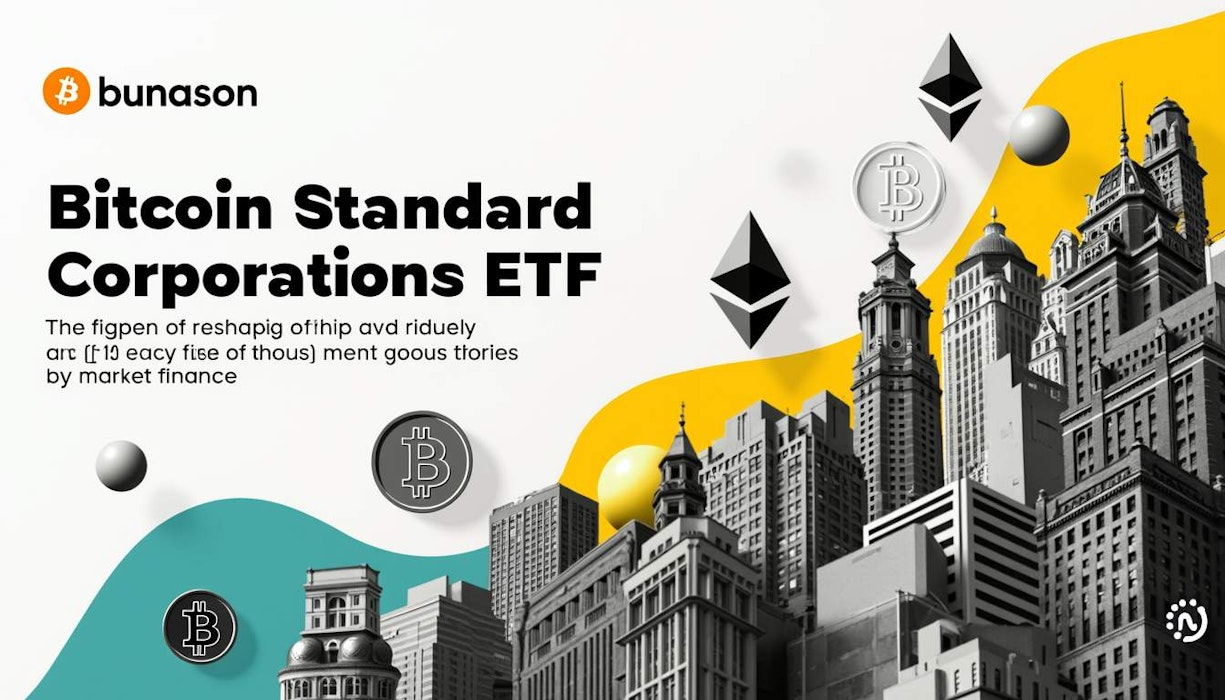What is the Bitcoin Standard Corporations ETF?
Q: What is the Bitcoin Standard Corporations ETF?
A: The Bitcoin Standard Corporations ETF, proposed by Bitwise, is an exchange-traded fund that invests in publicly traded companies holding over 1,000 Bitcoin (BTC) in their corporate treasuries. This ETF aims to provide investors with exposure to companies that have adopted the "Bitcoin standard", positioning Bitcoin as a strategic asset in their financial architecture.
How Does the ETF Weight Companies Differently?
Q: How does the ETF weight companies differently from traditional ETFs?
A: Unlike traditional ETFs that weight companies based on their market capitalization, this ETF gives priority to the market value of the Bitcoin held by each company. This means that companies with substantial Bitcoin reserves receive more focus in the ETF, even if their overall market capitalization is less than others. For example, Marathon Digital Holdings, which has over 44,000 BTC, will be weighted higher than Tesla, despite Tesla's far larger market cap.
What Are the Effects on Company Valuations?
Q: What are the effects of this ETF's weighting methodology on company valuations?
A: The unique prioritization in the ETF can significantly change how companies are valued. Those holding larger Bitcoin reserves will attract more investor attention, possibly boosting their market valuation. This ETF showcases Bitcoin as a key asset, which might compel companies to integrate Bitcoin into their financial strategies to gain inclusion in the ETF.
How Would This ETF Change Corporate Strategies?
Q: How would this ETF change corporate strategies?
A: This ETF encourages companies to adopt Bitcoin as a reserve asset, much like gold. This could reshape how they manage their finances and reserve allocations. By focusing on Bitcoin reserves, the ETF may prompt companies to adopt the "Bitcoin standard", ultimately impacting their valuation and market perception. Hence, companies might modify their financial strategies to increase their Bitcoin holdings, aiming for greater representation in the ETF.
What Are the Broader Implications for Financial Markets?
Q: What are the broader implications for financial markets?
A: The emergence of cryptocurrency-focused ETFs, such as this one, presents mixed implications for market volatility and traditional financial markets. On one side, they can enhance liquidity, improve price discovery, and draw a larger investor base, potentially decreasing price volatility. On the other side, Bitcoin's intrinsic volatility, regulatory unpredictability, and market manipulation risks present significant challenges. In totality, this ETF is expected to positively affect market stability and investor interest, but careful risk management remains essential.
What Are the Risks and Rewards for Companies Adopting Bitcoin?
Q: What are the risks and rewards for companies adopting Bitcoin in their treasury?
A: Companies incorporating Bitcoin into their treasury face both potential advantages and disadvantages.
Potential Rewards:
- Inflation Protection: Bitcoin's capped supply positions it as a hedge against inflation.
- Counterparty Risk Reduction: Companies can hold assets in self-custody, enhancing transaction transparency.
- Liquidity: The always-open market enables liquidity and offers capital appreciation potential.
- Financial and Strategic Gains: Firms like MicroStrategy and Tesla have enjoyed significant returns on their investments, boosting shareholder wealth.
Potential Risks:
- Price Volatility: Bitcoin's volatility may lead to unrealized losses, complicating balance sheets.
- Regulatory Barriers: Regulatory uncertainty contributes to price unpredictability and skepticism among corporate leaders.
- Cybersecurity Challenges: Protecting Bitcoin from hacks demands robust security protocols.
- Operational Strain: Companies must manage a volatile asset, liquidity issues, and navigate tax obligations.
- Reporting Complexities: Bitcoin's volatility may also complicate reporting and affect investor perception negatively.
Will Cryptocurrency ETFs Add to Market Volatility?
Q: Will cryptocurrency ETFs add to market volatility?
A: Emerging cryptocurrency-focused ETFs are more likely to mitigate market volatility rather than amplify it. They enhance liquidity, enabling buyers and sellers to meet in the market more smoothly. This trend is expected to decrease Bitcoin's historical volatility and make it more appealing to institutional participants.
How Do Crypto ETFs Compare to Traditional Equity ETFs?
Q: How do crypto ETFs compare with traditional equity ETFs in terms of risk and return?
A: Crypto ETFs differ markedly from traditional equity ETFs in risk and return due to the nature of the underlying assets.
Risk:
- Increased Volatility: Crypto ETFs face substantially higher volatility.
- Regulatory Ambiguity: Uncertainty surrounding regulation adds to risk.
- Security Dependence: Third-party custodians introduce vulnerabilities.
- Ownership Issues: Investors in crypto ETFs don’t own the underlying cryptocurrency directly.
Return:
- Potential for High Returns: Cryptocurrencies can yield high returns, appealing to investors.
- Diversification Opportunities: Crypto ETFs add a unique asset class for diversification.
Fees and Expenses:
- Higher Fees: Crypto ETFs often come with higher expenses.
Trading and Liquidity:
- Trading Hours: Crypto ETFs trade on traditional stock exchanges.
- Liquidity Factors: Their liquidity is influenced by distinct factors compared to equity ETFs.
In conclusion, while crypto ETFs provide a convenient way for exposure, they carry elevated risks, including significant volatility and higher fees, compared to traditional equity ETFs. However, they also offer diversification and potential for high returns, making them suitable for specific investors.
